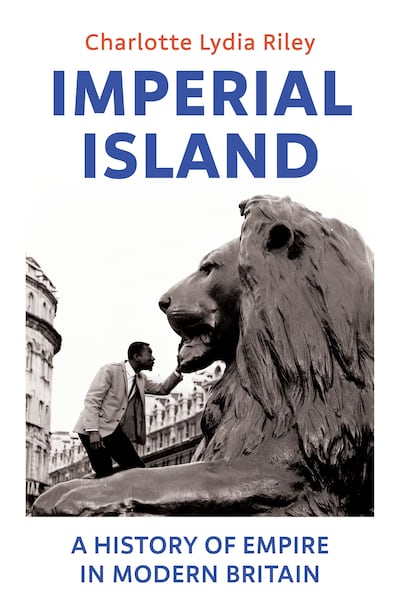In 1959, the BBC Caribbean Service produced a guide for prospective migrants to the United Kingdom. It included advice to be polite and forbearing with “white British people”, explaining much of the prejudice they experience will be due to ignorance: “I knew a Barbadian who was asked, in all seriousness, if the people in his country lived in houses or if they lived in the jungles and, also, if he had ever worn clothes before he came to England.”
Imperial%20Island%3A%20A%20History%20of%20Empire%20in%20Modern%20Britain
%3Cp%3EAuthor%3A%20Charlotte%20Lydia%20Riley%3Cbr%3EPublisher%3A%20Bodley%20Head%3Cbr%3EPages%3A%20384%3C%2Fp%3E%0A
Recounting the disturbing advice in her new book, author and historian Charlotte Lydia Riley writes these “sorts of questions are presented as deriving not from ingrained colonial racism, but from an imbalance of information: their knowledge of your country is much less than your knowledge of theirs”.
Imperial Island: A History of Empire in Modern Britain takes a deep-dive into the legacy of colonialism in Britain today, whether in the form of far-right groups like the National Front, or a bus company in Bristol in the sixties which faced a boycott after refusing to employ Asian or African drivers and conductors (the general manager even defended the policy, stating “the labour supply gets worse if the labour force is mixed”).
As various British colonies gained independence from the 1940s onwards, the UK’s foreign policy aspirations still appeared stuck in the country’s imperial past.
The media played an important role in perpetuating such myths, with the 1956 Suez invasion facilitated by papers such as the Daily Mail and Daily Mirror slandering then Egyptian president Gamal Abdel Nasser by making misleading comparisons with Adolf Hitler:
“One way that the Suez Crisis was embraced and amplified in Britain was through the use of analogies comparing Nasser to fascist figures, and discounting any peace talk as ‘appeasement’.," writes Riley. Nevertheless, there were mass anti-war protests in Britain against the invasion of Egypt.
Riley writes the Suez Crises was perhaps the beginning of the end for the empire: “a moment when even those who had once been proud of British imperial power were forced to concede that the nation was no longer the dominant international force; the United States and the USSR between them had put paid to that idea once and for all when they came together, despite their Cold War, to condemn British actions at the UN, thus forcing its humiliating withdrawal”.
But while the empire was on the wane, migration from the colonies to Britain was growing. Following the bloody aftermath of the partition in India and Pakistan in 1947, one migrant from the Subcontinent recalled “people were so unused to seeing Indian families that they would stop on Oxford Street to stare and point”.
In 1949, the British Nationality Act was passed, and in “one fell swoop, almost every inhabitant of the British Empire (or the former British Empire, in the case of India, Pakistan and Sri Lanka) was formally granted the right to live and work in the United Kingdom with no further paperwork required”.
In later decades, as migration from the Commonwealth countries swelled, entry into the erstwhile metropole became harder. When in 1968 Kenya began a policy of “Africanisation”, curtailing non-citizen’s right to trade and do business, thousands of Kenyan Asians began migrating to Britain. An estimated 190,000 Kenyan Asians were entitled to a British passport.
Riley writes how the Labour government “rushed through an updated Commonwealth Immigration Act”, extending controls on immigration to anybody whose parent or grandparent had not been born in, or was not a citizen of the UK: “Those travelling to Britain found themselves stripped of citizenship, sometimes in mid-air”.
The empire was not merely a physical entity with borders stretching across distant lands, but rather a state of mind, both for the colonialists and those they ruled over. This colonised mindset persisted long after the empire crumbled, its tentacles spreading into every nook and crevice of the British Isles, whether it be xenophobic attitudes towards migrants, racism within the police or interventionist foreign policy.
To investigate such a multilayered legacy is no walk in the park, but Riley’s prose flows smoothly, connecting the dots to give the reader the wider picture. For anyone curious about Britain’s colonial legacy in the modern era, Imperial Island will certainly be an eye-opener.
The five pillars of Islam
UAE currency: the story behind the money in your pockets
Score
Third Test, Day 2
New Zealand 274
Pakistan 139-3 (61 ov)
Pakistan trail by 135 runs with 7 wickets remaining in the innings
UAE SQUAD
Goalkeepers: Ali Khaseif, Fahad Al Dhanhani, Mohammed Al Shamsi, Adel Al Hosani
Defenders: Bandar Al Ahbabi, Shaheen Abdulrahman, Walid Abbas, Mahmoud Khamis, Mohammed Barghash, Khalifa Al Hammadi, Hassan Al Mahrami, Yousef Jaber, Salem Rashid, Mohammed Al Attas, Alhassan Saleh
Midfielders: Ali Salmeen, Abdullah Ramadan, Abdullah Al Naqbi, Majed Hassan, Yahya Nader, Ahmed Barman, Abdullah Hamad, Khalfan Mubarak, Khalil Al Hammadi, Tahnoun Al Zaabi, Harib Abdallah, Mohammed Jumah, Yahya Al Ghassani
Forwards: Fabio De Lima, Caio Canedo, Ali Saleh, Ali Mabkhout, Sebastian Tagliabue, Zayed Al Ameri
UAE currency: the story behind the money in your pockets
Business Insights
- Canada and Mexico are significant energy suppliers to the US, providing the majority of oil and natural gas imports
- The introduction of tariffs could hinder the US's clean energy initiatives by raising input costs for materials like nickel
- US domestic suppliers might benefit from higher prices, but overall oil consumption is expected to decrease due to elevated costs
THE BIO
Born: Mukalla, Yemen, 1979
Education: UAE University, Al Ain
Family: Married with two daughters: Asayel, 7, and Sara, 6
Favourite piece of music: Horse Dance by Naseer Shamma
Favourite book: Science and geology
Favourite place to travel to: Washington DC
Best advice you’ve ever been given: If you have a dream, you have to believe it, then you will see it.
Mohammed bin Zayed Majlis
'Brazen'
Director: Monika Mitchell
Starring: Alyssa Milano, Sam Page, Colleen Wheeler
Rating: 3/5
8 traditional Jamaican dishes to try at Kingston 21
- Trench Town Rock: Jamaican-style curry goat served in a pastry basket with a carrot and potato garnish
- Rock Steady Jerk Chicken: chicken marinated for 24 hours and slow-cooked on the grill
- Mento Oxtail: flavoured oxtail stewed for five hours with herbs
- Ackee and salt fish: the national dish of Jamaica makes for a hearty breakfast
- Jamaican porridge: another breakfast favourite, can be made with peanut, cornmeal, banana and plantain
- Jamaican beef patty: a pastry with ground beef filling
- Hellshire Pon di Beach: Fresh fish with pickles
- Out of Many: traditional sweet potato pudding
Brief scores:
Pakistan (1st innings) 181: Babar 71; Olivier 6-37
South Africa (1st innings) 223: Bavuma 53; Amir 4-62
Pakistan (2nd innings) 190: Masood 65, Imam 57; Olivier 5-59
The End of Loneliness
Benedict Wells
Translated from the German by Charlotte Collins
Sceptre
Specs
Engine: Duel electric motors
Power: 659hp
Torque: 1075Nm
On sale: Available for pre-order now
Price: On request
Jetour T1 specs
Engine: 2-litre turbocharged
Power: 254hp
Torque: 390Nm
Price: From Dh126,000
Available: Now
The biog
Favourite book: Animal Farm by George Orwell
Favourite music: Classical
Hobbies: Reading and writing
MOUNTAINHEAD REVIEW
Starring: Ramy Youssef, Steve Carell, Jason Schwartzman
Director: Jesse Armstrong
Rating: 3.5/5
Specs
Engine: Electric motor generating 54.2kWh (Cooper SE and Aceman SE), 64.6kW (Countryman All4 SE)
Power: 218hp (Cooper and Aceman), 313hp (Countryman)
Torque: 330Nm (Cooper and Aceman), 494Nm (Countryman)
On sale: Now
Price: From Dh158,000 (Cooper), Dh168,000 (Aceman), Dh190,000 (Countryman)
WHAT%20START-UPS%20IS%20VISA%20SEEKING%3F
%3Cp%3E%3Cstrong%3EEnablers%20of%20digital%20services%3C%2Fstrong%3E%3Cbr%3E%E2%80%A2%20Blockchain%20and%20cryptocurrency%3Cbr%3E%E2%80%A2%20Crowdfunding%3Cbr%3E%E2%80%A2%20Banking-as-a-service%3Cbr%3E%E2%80%A2%20Banking%20identification%20number%20sponsors%3Cbr%3E%E2%80%A2%20Issuers%2Fprocessors%3Cbr%3E%E2%80%A2%20Programme%20managers%3C%2Fp%3E%0A%3Cp%3E%3Cstrong%3EDigital%20issuance%3C%2Fstrong%3E%3Cbr%3E%E2%80%A2%20Blockchain%20and%20cryptocurrency%3Cbr%3E%E2%80%A2%20Alternative%20lending%3Cbr%3E%E2%80%A2%20Personal%20financial%20management%3Cbr%3E%E2%80%A2%20Money%20transfer%20and%20remittance%3Cbr%3E%E2%80%A2%20Digital%20banking%20(neo%20banks)%3Cbr%3E%E2%80%A2%20Digital%20wallets%2C%20peer-to-peer%20and%20transfers%3Cbr%3E%E2%80%A2%20Employee%20benefits%3Cbr%3E%E2%80%A2%20Payables%3Cbr%3E%E2%80%A2%20Corporate%20cards%3C%2Fp%3E%0A%3Cp%3E%3Cstrong%3EValue-add%20for%20merchants%2Fconsumers%3C%2Fstrong%3E%3Cbr%3E%E2%80%A2%20Data%20and%20analytics%3Cbr%3E%E2%80%A2%20ID%2C%20authentication%20and%20security%3Cbr%3E%E2%80%A2%20Insurance%20technology%3Cbr%3E%E2%80%A2%20Loyalty%3Cbr%3E%E2%80%A2%20Merchant%20services%20and%20tools%3Cbr%3E%E2%80%A2%20Process%20and%20payment%20infrastructure%3Cbr%3E%E2%80%A2%20Retail%20technology%3C%2Fp%3E%0A%3Cp%3E%3Cstrong%3ESME%20recovery%3C%2Fstrong%3E%3Cbr%3E%E2%80%A2%20Money%20movement%3Cbr%3E%E2%80%A2%20Acceptance%3Cbr%3E%E2%80%A2%20Risk%20management%3Cbr%3E%E2%80%A2%20Brand%20management%3C%2Fp%3E%0A%3Cp%3E%3Cstrong%3ENew%20categories%20for%202023%3C%2Fstrong%3E%3Cbr%3E%E2%80%A2%20Sustainable%20FinTechs%3Cbr%3E%E2%80%A2%20Risk%3Cbr%3E%E2%80%A2%20Urban%20mobility%3C%2Fp%3E%0A
MATCH INFO
Uefa Champions League semi-finals, first leg
Liverpool v Roma
When: April 24, 10.45pm kick-off (UAE)
Where: Anfield, Liverpool
Live: BeIN Sports HD
Second leg: May 2, Stadio Olimpico, Rome
UK-EU trade at a glance
EU fishing vessels guaranteed access to UK waters for 12 years
Co-operation on security initiatives and procurement of defence products
Youth experience scheme to work, study or volunteer in UK and EU countries
Smoother border management with use of e-gates
Cutting red tape on import and export of food
The specs
Engine: 2.0-litre 4cyl turbo
Power: 261hp at 5,500rpm
Torque: 405Nm at 1,750-3,500rpm
Transmission: 9-speed auto
Fuel consumption: 6.9L/100km
On sale: Now
Price: From Dh117,059
In Full Flight: A Story of Africa and Atonement
John Heminway, Knopff
RESULT
Arsenal 1 Chelsea 2
Arsenal: Aubameyang (13')
Chelsea: Jorginho (83'), Abraham (87')
'Cheb%20Khaled'
%3Cp%3E%3Cstrong%3EArtist%3A%20%3C%2Fstrong%3EKhaled%3Cbr%3E%3Cstrong%3ELabel%3A%20%3C%2Fstrong%3EBelieve%3Cbr%3E%3Cstrong%3ERating%3A%3C%2Fstrong%3E%204%2F5%3C%2Fp%3E%0A
Race card
1.45pm: Maiden Dh75,000 1,200m.
2.15pm: Maiden Dh75,000 1,200m.
2.45pm: Handicap Dh95,000 1,200m.
3.15pm: Handicap Dh120,000 1,400m.
3.45pm: Handicap Dh80,000 1,400m.
4.15pm: Handicap Dh90,000 1,800m.
4.45pm: Handicap Dh80,000 1,950m.
The National selections:
1.45pm: Galaxy Road – So Hi Speed
2.15pm: Majestic Thunder – Daltrey
2.45pm: Call To War – Taamol
3.15pm: Eqtiraan - Bochart
3.45pm: Kidd Malibu – Initial
4.15pm: Arroway – Arch Gold
4.35pm: Compliance - Muqaatil
Brave CF 27 fight card
Welterweight:
Abdoul Abdouraguimov (champion, FRA) v Jarrah Al Selawe (JOR)
Lightweight:
Anas Siraj Mounir (TUN) v Alex Martinez (CAN)
Welterweight:
Mzwandile Hlongwa (RSA) v Khamzat Chimaev (SWE)
Middleweight:
Tarek Suleiman (SYR) v Rustam Chsiev (RUS)
Mohammad Fakhreddine (LEB) v Christofer Silva (BRA)
Super lightweight:
Alex Nacfur (BRA) v Dwight Brooks (USA)
Bantamweight:
Jalal Al Daaja (JOR) v Tariq Ismail (CAN)
Chris Corton (PHI) v Zia Mashwani (PAK)
Featherweight:
Sulaiman (KUW) v Abdullatip (RUS)
Super lightweight:
Flavio Serafin (BRA) v Mohammad Al Katib (JOR)
Results
1. New Zealand Daniel Meech – Fine (name of horse), Richard Gardner – Calisto, Bruce Goodin - Backatorps Danny V, Samantha McIntosh – Check In. Team total First round: 200.22; Second round: 201.75 – Penalties 12 (jump-off 40.16 seconds) Prize €64,000
2. Ireland Cameron Hanley – Aiyetoro, David Simpson – Keoki, Paul Kennedy – Cartown Danger Mouse, Shane Breen – Laith. Team total 200.25/202.84 – P 12 (jump-off 51.79 – P17) Prize €40,000
3. Italy Luca Maria Moneta – Connery, Luca Coata – Crandessa, Simone Coata – Dardonge, Natale Chiaudani – Almero. Team total 130.82/198.-4 – P20. Prize €32,000
What can victims do?
Always use only regulated platforms
Stop all transactions and communication on suspicion
Save all evidence (screenshots, chat logs, transaction IDs)
Report to local authorities
Warn others to prevent further harm
Courtesy: Crystal Intelligence
Imperial%20Island%3A%20A%20History%20of%20Empire%20in%20Modern%20Britain
%3Cp%3EAuthor%3A%20Charlotte%20Lydia%20Riley%3Cbr%3EPublisher%3A%20Bodley%20Head%3Cbr%3EPages%3A%20384%3C%2Fp%3E%0A





